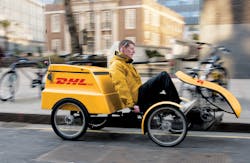A new study of “last mile” logistics will be unveiled by the Fraunhofer Institute for Material Flow and Logistics (IML) and component manufacturer ZF at the IAA Commercial Vehicle Show in Hanover later this month.
[When released, the study can be accessed online by clicking here.]
The study will present a forecast for the next ten years regarding the impact of key mega trends due to rising demand for last mile delivery services, including autonomous driving, “e-mobility” and supply logistics networking.
Key questions IML and ZF’s study will delve into include:
"When we talk about the future of logistics, we have to focus on the ‘last mile,’ [as] this is where most innovations and new logistics concepts will make a real difference," noted Prof. Uwe Clausen, head of IML, in a statement.
He added that some of the “general problems” being faced by freight transporters are that transport volumes, particularly to end customers, are steadily increasing while at the same time, online ordering and same-day delivery are “personalizing” the freight transport business and increasing time pressure.
Clausen noted that the freight industry might be able to leverage new technologies like digitization and automation in the next ten years. However, logistics service providers will also face increasing requirements when it comes to environmentally friendly transport and changes in demography and legislation as well over that same period, he argued.
About the Author
Fleet Owner Staff
Our Editorial Team
Kevin Jones, Editorial Director, Commercial Vehicle Group
Cristina Commendatore, Executive Editor
Scott Achelpohl, Managing Editor
Josh Fisher, Senior Editor
Catharine Conway, Digital Editor
Eric Van Egeren, Art Director

